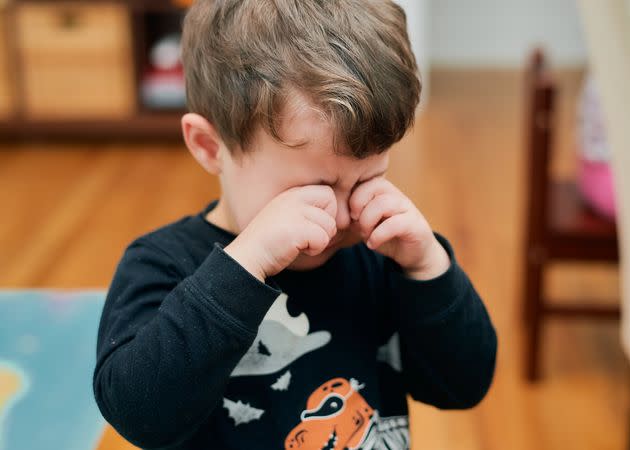This Symptom Might Flag Your Child Has The New Arcturus Covid Strain

Another variant of Covid-19 is doing the rounds – and this time it might be prompting an unusual symptom in children.
The Arcturus variant – a sub-variant of Omicron – is thought to be more contagious than its predecessor, with news reports suggesting it drove a 13-fold surge in India last month, prompting the use of face masks once again.
The variant has also been spotted on UK soil, with the UK’s Health Security Agency (UKHSA) acknowledging back in April that more than 100 sequenced cases had been detected and, of these, five people sadly died.
So what do parents need to know? The main thing is that this new variant seems to be causing more eye issues in kids – specifically conjunctivitis.
Dr William Schaffner, an infectious disease specialist at Vanderbilt University Medical Center in Nashville, told the Mirror: “The most distinctive feature is that it seems to have a tendency to produce conjunctivitis, particularly in children.”
Conjunctivitis or pink eye usually affects both eyes and can make them: red, feel gritty or like they’re burning, itchy, watery or produce a pus that sticks to the lashes.
Doctors in India have also confirmed that “sticky eyes” seem to be on the rise in kids with the variant.
Dr Vipin Vashishtha, a paediatrician in Bijnor, India, said it’s causing “itchy” conjunctivitis with “sticky eyes” and added other prevalent symptoms among kids include high fever, cold and cough.
Dr Semiya Aziz, a GP based in London, tells HuffPost UK she has witnessed a recent increase in children with conjunctivitis and a fever, which seems to spread onto other family members, too.
“We often assume these are due to common viral infections and advise simple measures of eye hygiene at home, but are also aware that conjunctivitis is a new symptom of the new Covid-19 variant,” she says.
“Realistically however in general practice, it has been difficult to differentiate whether the cause is due to the new Covid-19 variant or a common URTI (upper respiratory tract infections) and so I often advise various routine measures having assessed and examined the state of the child.”
It’s worth noting that other viruses like adenovirus, which is common this time of year, can also cause conjunctivitis.
What to do if your child has conjunctivitis?
If your child does have conjunctivitis but no other symptoms, the NHS advises they can still go to school unless they feel unwell. However some nurseries and childcare providers won’t accept children with it because it’s contagious.
“Most situations get better in a couple of weeks without treatment,” says Dr Aziz.
Parents can use cool boiled water to wipe their child’s eyes with a clean cotton wool pad – use a fresh pad per eye. If their eyes are itchy or burning you can also hold a cold flannel on their eyes to soothe them.
Encourage your child not to rub their eyes and to wash their hands regularly. If soap and water are not available, you can use hand sanitiser with at least 60% alcohol.
It’s also important to wash pillow cases and face cloths in hot water and detergent to kill any germs, and to encourage your kids to cover their mouth and nose when sneezing and put used tissues in the bin.
Pharmacists can also provide eyedrops to help ease symptoms.
If your child also has an upper respiratory tract infection – symptoms of which commonly include cough, sore throat, runny nose, fever and headache – they’ll need to rest and drink plenty of fluids, says the GP.
“Medications such as nonsteroidal anti-inflammatory drugs (NSAIDs) such as ibuprofen if suitable or paracetamol (Calpol) can be given for fever and aches,” she adds.
Related...
Pollen Triggered This Eight-Year-Old's Asthma Attacks – They're So Severe His Mum Had To Quit Work
Can A Parent Of A Child With Chickenpox Pass It On? We Asked Health Experts
Got A Sick Child? This Is When You Can (And Can't) Send Them To School
First Fever, Then Rash: The Symptoms Of Measles Parents Need To Know

 Yahoo News
Yahoo News 